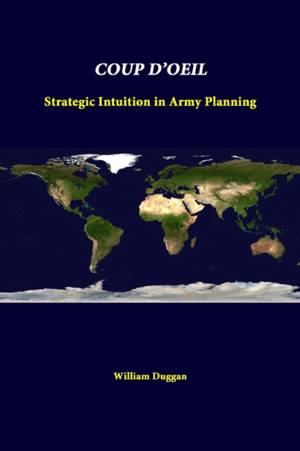
- Afhalen na 1 uur in een winkel met voorraad
- Gratis thuislevering in België vanaf € 30
- Ruim aanbod met 7 miljoen producten
- Afhalen na 1 uur in een winkel met voorraad
- Gratis thuislevering in België vanaf € 30
- Ruim aanbod met 7 miljoen producten
Zoeken
Coup D'Oeil
Strategic Intuition In Army Planning
William Duggan, Strategic Studies Institute
Paperback | Engels
€ 23,45
+ 46 punten
Omschrijving
In our military professions, formal analytical methods co-exist with intuitive decisionmaking by leaders in action. For the most part, there is no harm done. But many officers can recount times when they knew they should have "gone with their gut," but followed instead the results of their analytical methods. The gap between these two forms of decisionmaking perhaps has grown wider in recent times, especially in Iraq, where adaptive leadership seems to have overshadowed formal methods of planning. Departing from formal methods increasingly seems to be the mark of an effective commander, as we learn from Dr. Leonard Wong's recent Strategic Studies Institute (SSI) report, Developing Adaptive Leaders: The Crucible Experience of Operation Iraqi Freedom (July 2004).
Specificaties
Betrokkenen
- Auteur(s):
- Uitgeverij:
Inhoud
- Aantal bladzijden:
- 66
- Taal:
- Engels
Eigenschappen
- Productcode (EAN):
- 9781312319271
- Verschijningsdatum:
- 30/06/2014
- Uitvoering:
- Paperback
- Formaat:
- Trade paperback (VS)
- Afmetingen:
- 152 mm x 229 mm
- Gewicht:
- 108 g

Alleen bij Standaard Boekhandel
+ 46 punten op je klantenkaart van Standaard Boekhandel
Beoordelingen
We publiceren alleen reviews die voldoen aan de voorwaarden voor reviews. Bekijk onze voorwaarden voor reviews.











